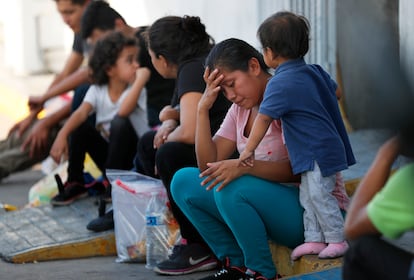About Alfonso Mercado’s work is gray. And his beard. In fact, in 46 years, his hair is completely white, and he blames his work as a psychiatrist on the American -Mexican border. Mercado-who is also a professor of clinical psychology at the University of Texas Rio Grande Valley-a decade in the search for the shock of millions of foreigners who reach the southern border of the country. He did this during four presidency: Barack Obama, Old Trump I, Joe Biden and now Trump II. And throughout that time, regardless of whether there was a democratic or Republican in the White House, it was a witness to violations and high levels of suffering suffering from plague in the region.
In an interview with El País via video call, Mercado – the son of Mexican immigrants who were born in Los Angeles – describes some cases he had dealt with. Like a 12 -year -old boy, and after separating his family when crossing the border during the first period of Trump, he began to show the symptoms of schizophrenia. Or so he looked: “He was not communicating with anyone. He was talking to himself, walking back and forth in his room.[We] He discovered, at more evaluation, that the young boy was praying at night for his predecessors to meet with my mother. So it was not psychosis. We were dealing with a child with acute stress symptoms and post -trauma disorder“
Now, with Trump’s return, is stronger than before and with the migration agenda that includes the closure of the border to asylum seekers and the detention of millions of immigrants and their deportation, MERCADO knows that his job is more important than ever. “Because I am very concerned about what will come,” he emphasized.
a question. I was there when the Trump administration started separating families in 2018, which changed the policy of immigration forever. What do you remember about these early cases?
answer. I started seeing what I initially thought isolated cases to separate the family. Initially, you were like, perhaps the issue of human trafficking, did you know? But I kept getting refugees from the Refugee Resettlement Office, Child Protection Services, various organizations and shelters that want to guide. They will tell me, we have this 3 -year -old boy and we believe he has autism. He does not communicate, he does not eat, he does not sleep, and he recites himself, so unite must be, right? But 99.9 % of the time, when more evaluation, as soon as I see them, was not autism. They were children with severe stress and shock symptoms. The same type of trauma symptoms that I see in the old combat warriors, but these were young children.
Q: Have you also worked with families who were forced to wait in Mexico under the protocols of immigrant protection, known as the “Stay in Mexico” program?
A. Yes, we have searched and volunteered in different tent camps, one in Matamorus, Mexico, for example the Bronzville borders, for example. The shock rates we see were very concerned. I am a psychiatrist, so nothing really prevents me. But what we saw was the symptoms of great shock and shock exposure. Data indicated to this category of population to a large extent the clinical cutter scale of post -traumatic disorder of more than 16 points. Sixteen points! That was when we started to realize that the only crisis on the border is mental health.

Q: What are the long -term effects of this type of shock?
A. One thing I want to explain is that these policies that existed, such as “zero tolerance” to separate the family and “staying in Mexico”, caused abuse. Years later, when I visited some of the children who were separated in their homes throughout the two countries, they were not the same, even if they returned with their parents. It was difficult for them to integrate into a society that offended them. It was clear that the shock was everywhere. It was a daily part of their lives. It affects their personal work at home, their communication and socialization.
Q: What about their parents?
A. It was about me to visit some of these cases after years and saw how it affected not only this person, the child, but the family as well as their environment, their teachers, their community. I stumbled. You have these people who have a great shock in their countries of origin. Not to mention the trauma that endured during the migration journey. Then they come to seek asylum here and face anti -immigration policies that increase trauma symptoms.
Q: Is there enough mental health services and resources on the border?
A. The most important thing for me as a psychiatrist, unlike the stories that I just shared with you, is that the immigration system as a whole is not shocked. There is no informed care for these people. nothing.
Q: Now, in its second term, the Trump administration relied on the installation of terrorism. They want people to believe that anyone can be held and deported at any time, regardless of the situation.
A. This not only affects the unreliable individual and their families with a mixed situation, but it affects all American citizens. They see the news what is happening and the fear is real. This fear has no discrimination. Anyone can face this now, at such unconfirmed times.

Q: Trump’s government is returning some of its first administration policies, such as “staying in Mexico”. As a person working with immigrants when these policies were enacted for the first time, how do you prepare to do this again?
A. Now more important to benefit from the efforts to call for science and human rights. In the past few years, the American Psychology Association, including me and a small team, is trying to do so. To shed light on the facts of our immigration system, especially here in the frontal lines of the border, and show how we can inform the invitation efforts by benefiting well.
Q: What makes you continuous after 10 years?
A. It is really integrated into our moral symbols as psychologists: it does not harm, and help those in need. I also know that I play a role in training in the future psychologists to play this type of work here on the border. Because my students love to do this type of work because they know that they are making a difference and give a voice that has no sound.
Subscribe to Our weekly newsletter For more news coverage in English from El País USA Edition
